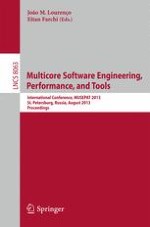This book constitutes the refereed proceedings of the International Conference on Multiscore Software Engineering, Performance, and Tools, MUSEPAT 2013, held in Saint Petersburg, Russia, in August 2013. The 9 revised papers were carefully reviewed and selected from 25 submissions. The accepted papers are organized into three main sessions and cover topics such as software engineering for multicore systems; specification, modeling and design; programing models, languages, compiler techniques and development tools; verification, testing, analysis, debugging and performance tuning, security testing; software maintenance and evolution; multicore software issues in scientific computing, embedded and mobile systems; energy-efficient computing as well as experience reports.
